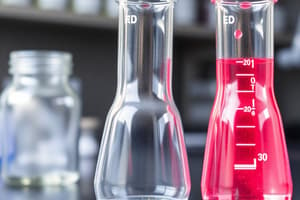Podcast
Questions and Answers
What does a positive electrode potential indicate?
What does a positive electrode potential indicate?
The substance will donate electrons spontaneously.
What was discovered by Michael Faraday regarding the amount of electricity needed to deposit or dissolve a substance?
What was discovered by Michael Faraday regarding the amount of electricity needed to deposit or dissolve a substance?
It is the same for one mole of any substance, regardless of the substance or cell involved.
What is electrolysis?
What is electrolysis?
The process of using an electric current to break down electrolytes into their constituent elements or compounds.
Why is Faraday's second law significant in electrochemistry?
Why is Faraday's second law significant in electrochemistry?
How does electrode potential relate to the tendency of a substance to accept electrons?
How does electrode potential relate to the tendency of a substance to accept electrons?
In electrochemistry, what role do redox reactions play?
In electrochemistry, what role do redox reactions play?
What is the purpose of electrolysis in industry?
What is the purpose of electrolysis in industry?
Define oxidation and reduction in the context of redox reactions.
Define oxidation and reduction in the context of redox reactions.
Explain the difference between galvanic (voltaic) cells and electrolytic cells.
Explain the difference between galvanic (voltaic) cells and electrolytic cells.
What are some applications of electrochemistry?
What are some applications of electrochemistry?
How do Faraday's laws relate to electrolysis?
How do Faraday's laws relate to electrolysis?
What role do electrode potentials play in electrochemical cells?
What role do electrode potentials play in electrochemical cells?
Flashcards are hidden until you start studying
Study Notes
Exploring Electrochemistry: From Potentials to Cells
Electrochemistry is an interdisciplinary field that studies the relationships between electricity and chemical reactions. It encompasses several subtopics, including electrode potentials, Faraday's laws, electrolysis, redox reactions, and electrochemical cells, which we'll delve into to better understand this fascinating science.
Electrode Potentials
The starting point for electrochemistry is the electrode potential, which measures the tendency of a substance to donate or accept electrons. A positive electrode potential indicates that the substance will donate electrons spontaneously, while a negative electrode potential means the substance will accept electrons spontaneously. This tendency is influenced by the energy levels of the electrons in the respective substances.
Faraday's Laws
English scientist Michael Faraday found two fundamental principles in electrochemistry. First, the amount of electricity needed to deposit or dissolve one mole of any substance is the same, regardless of the substance or the electrochemical cell involved. Second, the amount of substance deposited or dissolved is directly proportional to the amount of electricity passed through the solution. These laws provide a basis for understanding and quantifying electrochemical processes.
Electrolysis
Electrolysis is the process of using an electric current to break down electrolytes (ionic compounds) into their constituent elements or compounds. This process is often used in industry to produce substances like aluminum, chlorine, and other chemicals. Electrolysis uses electrode potentials to separate elements in an electrochemical cell, which consists of two electrodes placed in an electrolyte solution.
Redox Reactions
Redox reactions (oxidation-reduction reactions) are fundamental to electrochemistry. Oxidation refers to the loss of electrons by a substance, while reduction refers to the gain of electrons by a substance. When a redox reaction occurs, the electrons are transferred through an external circuit or directly between the reactants.
Electrochemical Cells
Electrochemical cells are devices that use redox reactions to generate electricity or use electricity to drive redox reactions. There are two general types of electrochemical cells: galvanic ( voltaic) cells and electrolytic cells. Galvanic cells convert chemical energy into electrical energy, while electrolytic cells use electrical energy to drive chemical reactions that would not occur spontaneously.
Galvanic cells consist of two half-cells, each with an electrode immersed in an electrolyte solution. The two half-cells are connected by a salt bridge or a porous membrane. Electrolytic cells, on the other hand, include an external power source, such as a battery, to force the redox reaction to occur.
Applications and Future Prospects
Electrochemistry has a broad range of applications, including:
- Corrosion protection
- Batteries and energy storage
- Electroplating
- Electrochemical sensors
- Water purification and desalination
- Fuel cells
In the future, electrochemistry is expected to play an increasingly important role in addressing challenges related to energy storage, green chemistry, and environmental sustainability. Innovative electrochemical technologies, such as solid-state batteries, fuel cell vehicles, and advanced water treatment methods, are being developed to improve the efficiency, safety, and sustainability of energy production and use.
Understanding the fundamentals of electrochemistry will help you appreciate the intricate relationships between electricity and chemical reactions that drive so many essential technologies and processes in modern society. As you delve deeper into this fascinating field, you'll discover innovative applications and emerging challenges that will shape the future of electrochemistry.
Studying That Suits You
Use AI to generate personalized quizzes and flashcards to suit your learning preferences.



